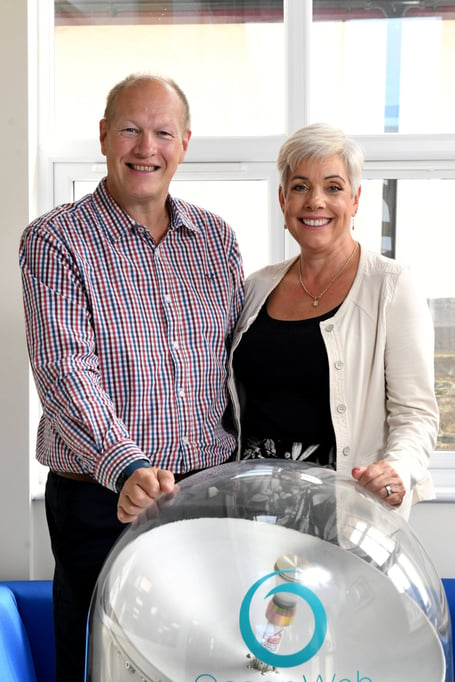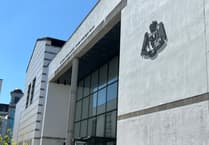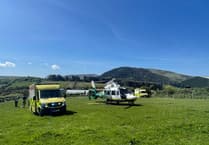Around 2,000 people in the Isle of Man are employed in the maritime industry in some capacity.
That could be anything from actually working on a boat to ship management, insurance, or as corporate services provider.
OceanWeb, based in Port Erin, looks after the communications for more than 100 superyachts around the world.
‘We provide satellite and internet connections, we do all their onboard IT networks and, increasingly, audio visual television and sound systems,’ says director Ben Hextall.
As he goes on to explain, the mundane reality is that a super-yacht is very much like any ordinary office in that it requires networks, both wired and wireless, and servers.
The traditional office might have an in-house IT expert, or it might be outsourced, but someone will look after that network and this is the function Ben and his team performs for the superyachts.
And, of course, they do it remotely, often from thousands of miles away.
Ben says: ‘We put a in headless computer [a tiny unit with no screen or keyboard] that monitors hundreds of items – the entire network – remotely and if anything happens it notifies us.
‘The yacht might have 20 or 30 wireless access points to give internet for mobile devices and, if one of them fails, we know about it before the crew so we can remotely log in and reboot it, or fix it, or post a new one out to them.’
Their team of six technical support engineers can also investigate if anyone on board the yacht is having a problem with, maybe, a printer or a loss of internet and talk them through how to fix it.
Sara, Ben’s wife and fellow director, says: ‘The people that we’re looking after on board are the crew. We are just making sure that the communications on board are at a level where they are efficient all the time so that the crew can use the internet for everything they need, like all the communications, all the weather and emails.
‘The boats that we look after are either private boats that are owned by a very wealthy person who wants to carry on working when they go on board – or do their internet shopping, or stream a movie – or they are run as charter boats, as a business, so they’ve got paying guests on board who are expecting a high level of connectivity all the time.’
An important element is directing this connectivity around the boat wherever usage is highest at the time, which means ensuring that it is allocated to the correct routers, as Ben explains: ‘On a yacht, the internet you can get is generally not as fast as you can get at home and there’s a lot more people using it there so the allocation of that is the bit that takes a lot of my team’s skills.
‘So if, for example, somebody wanted to stream a Netflix movie, then we have to make sure that there is sufficient bandwidth going to that television.’
In addition to that, there is the problem of latency, or the time delay it takes for a communication to travel what may be thousands of miles without the usual support of fibre cables and other infrastructure. This might be only seconds but can be crucial in certain scenarios.
Ben says: ‘I’ve been on boats where there’s an office with four screens and the owner is trading all the time so then you have to look at the latencies of the connections because going through a satellite takes a long time. Using 4G is much quicker, but a satellite works globally.’
In addition to their support role, OceanWeb also provides the network equipment.
Sara says: ‘The other side of what we do is that boats will require upgrades on a regular basis: technology, of course, moves very quickly.
‘So the engineering team will put together a scope of work for different boats and plan these refits then they will order all the kit, which wil22l come here and it will all be looked at and configured. Then the kit will be sent to the boat and the engineers will go and they might be on board for three or four days to fit this equipment, to configure it and to commission the antennae – they have quite an exciting life really.’
Indeed, it is not every IT specialist who gets to travel around the world and visit superyachts as part of his, or her, role.
OceanWeb, as a business, grew out of a love of the sea and sailing and a talent for IT. Ben studied for a PhD in marine ecology at the former Marine Biological Centre in Port Erin, and this is where he met Sara, who is Manx-born and whose father was a lecturer there.
Ben recalls: ‘I was using Apple computers a lot for my PhD and afterwards I ended up working for Apple Computers briefly and I had a great friend who was a yachting photographer he was based on the south coast.’
This ‘great friend’, it turns out, is none other than the world-renowned Manx photographer, Rick Tomlinson, who has been covering every major global sailing race for a number of decades.
Ben goes on: ‘One day we were chatting and he said: “What do you want to do?” and I said: “Well I want to do something with IT and boats” and he said: “Well I’m about to do the Whitbread [Round the World Race] – we can do some deal where I’ll be your first customer.’
It was a smart decision for both of them. Ben used his IT skills to work out a ground-breaking way for Rick to send his images from wherever he was in the world back to Ben in the UK who would then distribute them to the media.
It worked so well they ended up sharing an office for the next four years.
Ben says: ‘I worked with the Vendee Globe and Mike Golding and then Clipper, BT Global. Then we had 9/11 and the dotcom boom bust.’
At the time they also had one large yacht as a client and, whilst the world economic situation looked to be going from bad to worse, Ben noticed that its owner was impervious to it and realised that this type of customer would be good to have more of.
Ben says: ‘It took quite a few years to get another one. It’s a very closed market.’
Sara adds: ‘We were doing websites by that point and that’s what attracted them.’
Having previously worked in human relations for a large company, Sara had also joined Ocean Web as it began to grow. They relocated to the Isle of Man with their two young children in 2006 and set up their office in rooms above the former video shop in Port Erin.
As they started to outgrew that, they purchased the old Sunday school, next door to the Erin Arts Centre and spent two years getting planning permission and converting it into a unique, purpose-built office and IT workshop which retains many of the original features of the old building including its vaulted ceilings and tall windows, fittingly overlooking Port Erin bay.
The relentless pace at which technology continues developing has meant more advanced and diverse kit being required for their clients.
Ben says: ‘Anything IP-based we’re good at. That’s what we love. In the old days, audio visual on a boat would be a television and a video cassette player. Now, all the AV systems are IP-based so we’ve got a project where we’ve got probably eight or nine big components of CCTV systems, a PBX telephone systems, all the AV on the yacht as well so that’s quite exciting.’
And their reputation is growing as Ben goes on to explain: ‘We’re getting emails out of the blue now saying: “You helped out on that yacht, can you help us with this?” and that is such a great feeling. The shipping industry is very small and it’s word of mouth.
‘We have a simple ethos. We always try our best. Also everybody on a yacht is important to us so, quite often we are dealing with a third engineer, or a second engineer who, in three year’s time, will phone us up and say: “Hi I’m now the chief engineer on this yacht, you helped me then can you help us now” – it’s all about those relationships…’



.jpeg?width=209&height=140&crop=209:145,smart&quality=75)
.JPG?width=209&height=140&crop=209:145,smart&quality=75)
Comments
This article has no comments yet. Be the first to leave a comment.